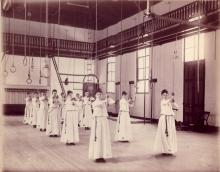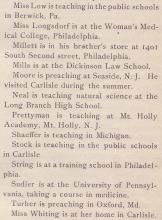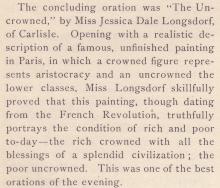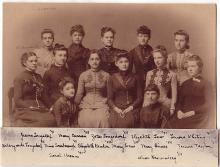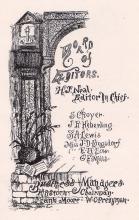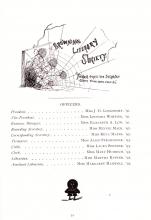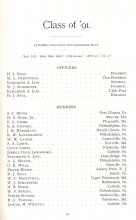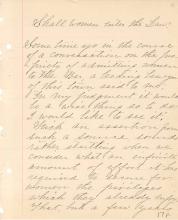Ringing of Wedding Bells: Zatae Longsdorff
Taken from the George Edward Reed scrapbook, this newspaper clipping announces the marriage of Zatae Longsdorff (Class of 1997) to A. Gale Straw of New Hampshire. They married at 105 West Louther St., Carlisle, PA, and all of the Dickinson faculty were present. The article goes on to describe the wedding party, dressed in blue with chrysanthemums as well as cream silk dresses for the bridesmaids. Zatae wore a white silk dress with a veil. The Dickinson College Glee Club provided entertainment at the reception.
The Dickinsonian Documents the Whereabouts of the Class of 1891
The whereabouts of the graduated class of 1891 is documented by the October 1891 issue of the Dickinsonian. Three of the female students are among the other graduates mentioned. Elizabeth Low is mentioned as a teacher in the public schools in Berwick, Pennsylvania, Jessica Longsdorff is studying at the Woman's Medical College in Philadelphia and Lenora Whiting is staying at her home in Carlisle.
Jessica Longsdorff's Senior Oration "Was One of the Best"
The 1891 July Dickinsonian further comments on Jessica Longsdorff's performance for the Senior Oratorical Contest. Her oration was written on "The Uncrowned," which is about paintings from the French Revolution. The Dickinsonian proclaims that hers was "one of the best orations of the evening."
Photograph Circa 1887 of Early Co-Eds at Dickinson College and Preparatory School
This photograph is a group picture of early female students of both Dickinson College and the Preparatory School from circa 1887. The women included in this picture are Zatae Longsdorff '87, Mary Curran '88, Hildegarde Longsdorff '88, Elizabeth Bender '88, Mary Evans '89, Alice Kronenberg '89, Mary Himes '89, Jennie Taylor '89, Jessica Longsdorff '91, Elizabeth Low '91, Lenora Whiting '91, Wilhemina Scarborough '91, and Sarah Yocum '91.
Two Out of the Three Co-eds Elected to Editors
The 1889 Dickinsonian comments upon the Junior class's selection of editors to write for the Microcosm. Both Elizabeth Low and Jessica Longsdorff were selected for editors of the yearbook. The Dickinsonian believed that "the usual sound judgment of this class must have been temporarily obscured by some sudden streak of gallantry" to let two of the three co-eds participate.
Browning Literary Society of 1890
The Browning Literary Society was the first mention in the 1890 Microcosm of a society with female involvment. The society was completely comprised of women. It seems that almost all the women who were on campus were involved with the Browning Literary Society. The President was Jessica Dale Longsdorff, Vice-President was Leonora Whiting, Business Manager was Elizabeth A.
Junior Class of 1891 in the Microcosm
A page in the 1890 Microcosm lists the officers and members of the Junior class of 1891, denoting three women who were attending Dickinson. These three women were Elizabeth A. Low, Jessica Dale Longsdorff, and Leonora M. Whiting. Under the class officers, Elizabeth A. Low held two positions as secretary and class poet. Along with three other male names, the three women's names were politely spelled out rather than initialed.
Shall Women Enter the Law?
This oration analyzes whether or not women should be permitted to study and practice law. Low argues that since procured positions within the medical field, philanthropic organizations, newspapers and academia, "humanity has been lifted up during the period in which she has been permitted to play her legitimate part in the drama of human life." However, she argues that woman's work is not done and that women must continue to fight for equal acess as men will not freely give up their power within closed professions, particularly the law.

